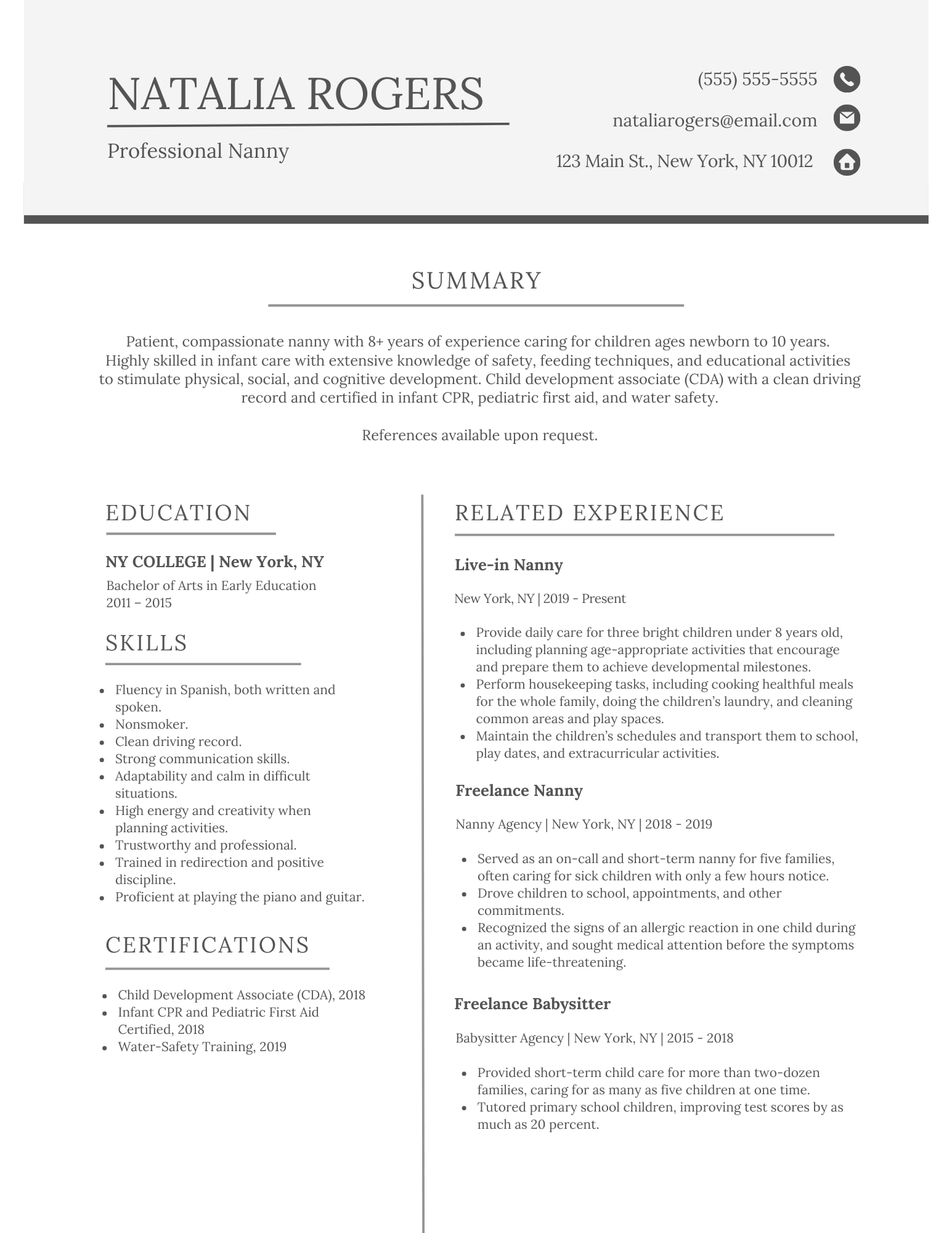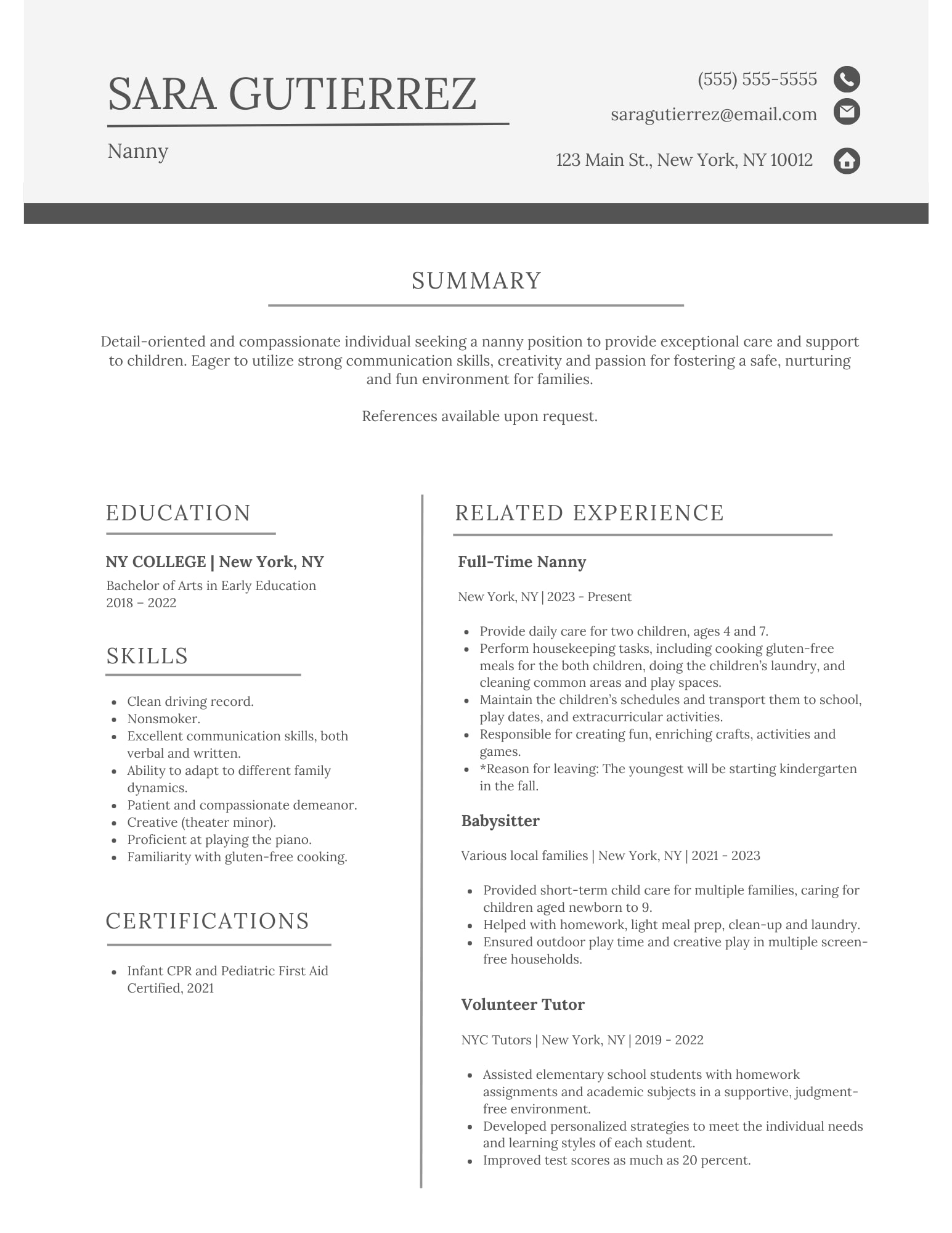In this article
It goes without saying that you want to stand out when applying for nanny jobs. And step one in that process is having an impossible-to-ignore nanny resume. How can you do this? According to Lydia Thibodeau, founder of Sommet Nannies in Boston, it all starts with having a resume that presents well aesthetically.
“It may sound silly, but a lot of resumes aren’t in a readable layout,” she says. “When you take the time to make sure everything is properly formatted, it shows you’re thoughtful in your approach, which translates to how you care for children and how seriously you take your job.”
From what to include on your resume (and what to leave off) to nanny resume examples, here’s everything you should keep in mind when crafting a professional nanny resume.
Key takeaways
- To land a nanny job, create a clear, well-formatted resume that highlights your child care experience, certifications and unique skills.
- Tailor each section to show your qualifications and personality.
- Avoid typos, unrelated jobs and sharing private references.
Nanny resume examples
Below, find two nanny resume examples — one for an experienced nanny, and another for a newer nanny with less experience.
Nanny resume template for folks with experience

(Click to download this nanny resume template as a PDF.)
Nanny resume sample for folks with less experience

(Click to download this nanny resume template as a PDF.)
What to include on a nanny resume
Here are the key sections you should always include on your nanny resume, according to Thibodeau and other industry experts.
1. Contact information
Your name, phone number, email address and any professional websites or social profiles should be at the top of every individual page of your resume. And it’s worth noting, nanny resumes needn’t be just one page if you have a lot of experience. The “one page resume advice” is outdated, according to Thibodeau.
2. Summary statement
Also referred to as a “Summary of Qualifications,” a summary statement essentially highlights your experience, qualifications and more in a few short sentences at the top of your nanny resume.
A nice addition to this section, notes Briana Murphy of Your Nanny Resume is a personal tagline. “This statement enhances your qualification summary and makes your resume stand out by branding yourself.” (As a nanny career coach, Murphy’s tagline is: “Revamping lackluster resumes and guiding careers to new heights.”)
3. Past nanny, babysitting and child care experience
This section is key, but instead of listing every nanny job you’ve had by rote, be specific (and succinct). According to Thibodeau and Murphy, here’s what information to include for each job:
- The dates you worked for each family.
- The ages of the children when you started and finished. (“This,” notes Murphy, “showcases the breadth of skills and expertise you have gained over time, illustrating your capability to work effectively within various age groups.”)
- Where the family was located (not specifics).
- What you did in your role. (“Don’t just say ‘laundry and child care,’” says Thibodeau. “Include specifics, such as ‘prepared gluten-free meals,’ potty-trained,’ etc.”)
Another thing to potentially include here is the reason you left each job, notes Thibodeau. “Families will want to know,” she says, “so you can add something like: ‘Parents put the child in daycare, and I needed full-time work’ as a bullet point. This shows you want work and are committed to the role.”
4. Educational background
Not all nanny positions require a degree, but if you have an associate’s degree or higher, it could help set you apart from other applicants by showing advanced training and/or relevant coursework that has prepared you for this specific job. Similarly, if you are currently enrolled and have plans to graduate, you can include your degree along with your expected graduation date (ex. Early Childhood Education, Expected Graduation Date May 2025).
“You can also include your major — especially if it’s child-related,” Thibodeau notes. That said, even if it’s not, and you completed a four-year degree in a specific area, it’s a good idea to include, as it “shows dedication and commitment.”
5. Certifications and training
Highlighting your certifications and specialized training can give you a leg up on the competition. Many nanny positions, for example, stipulate that applicants must be certified in CPR and pediatric first aid. Others might give preference to those who have obtained the Child Development Association (CDA) credential for early childhood education.
Even if the job listing doesn’t specifically call out certifications, you should still mention any training you have that could prove useful in your role as a nanny, such as a water-safety course.
The completion of specialized trainings demonstrates your expertise and reflects your dedication to ongoing learning and professional development, Murphy notes. “By showcasing your commitment to enhancing your skills, you are conveying your willingness to go above and beyond in your role as a nanny.”
6. Skills that qualify you for a nanny job
When it comes to listing your skills, think outside the box about what makes your nanny services unique.
“Families love athletes,” Thibodeau says, “So, if you played a sport in college or play one now, list that.” Other skills to consider listing, according to Thibodeau, are things like “being an excellent baker, music skills or theater or improv experience.” She says, “Some of the best nannies we’ve ever had have been theater majors. They have loads of energy and creativity.”
Creating a separate section to highlight skills is another way you can show families at a glance that you are the right person for the position. You should list a combination of “hard” skills that are fairly easy to quantify, and “soft” skills that are slightly more intangible but nonetheless important.
Examples of nanny skills
| Hard skills | Soft skills |
| • Fluent in Spanish, both written and spoken. • Meal planning. • Experience in housekeeping tasks. • Reading music. • Computer programs (Word, Excel, etc.). • Clean driving record. • Nonsmoker. • Playing piano. | • Multitasking. • Time management. • Positive discipline. • Creative problem-solver. • Patience/compassion. • Conflict resolution. • High energy. • Flexibility/adaptability. |
Helpful additions you may include on your nanny resume
While not essential, Thibodeau and Murphy recommend considering the following on your nanny resume — particularly if you don’t have a robust work history:
- Headshot. If you’re going to include a headshot on your resume or website, be sure it’s a simple from-the-shoulders-up shot that’s unfiltered and doesn’t include children.
- Photos of crafts, projects, meals, etc. If you created something you’re proud of — with or without the kids — share it! Thibodeau says she loves seeing photos of “a beautifully prepared meal or organized closet” on nanny resumes.
- Volunteer experience. Volunteer work, Murphy notes, shows “your dedication to giving back to the community and can demonstrate your character traits, such as empathy and compassion, which are valuable qualities as a nanny.”
Read more:
Nanny resume mistakes to avoid
In addition to making sure your nanny resume contains certain criteria, it’s also important you avoid these common mistakes.
Not proofreading. You don’t get a second chance to make a first impression — and if your resume is jumbled, unformatted and rife with typos, there’s a good chance it won’t make the cut, Thibodeau says.
This also goes for dates, Thibodeau adds. Be sure to read and re-read your resume several times (or give it to a friend to read) to make sure the dates all make sense. “I’ve received resumes that show full-time jobs while people were in college, as well as daycare start dates in March of 2020,” she says. “If the dates don’t make sense, it may call your integrity into question.”
Listing non-pertinent jobs. Stick to the child care jobs and experience, Thibodeau says. “You don’t need to include that you worked at Dunkin’ Donuts in high school,” she says. “That’s not going to be of interest to agencies or families.”
Including personal information of references. Simply write “references available upon request,” says Thibodeau. “This shows you have discretion when it comes to families and aren’t willing to hand out their information to anyone.”
The importance of perfecting your nanny resume
When it comes to landing a coveted job, your nanny resume is a crucial part of the process, and investing the time and energy is smart.
In addition to making sure your resume presents well, format-wise, Thibodeau stresses the importance of both being specific and not selling yourself short. “When listing past jobs, don’t make each one a mirror image of one another,” she says. “Be detail-oriented, and include anything you may have that translates to the job — this is your chance to show families what’s unique about you.”





